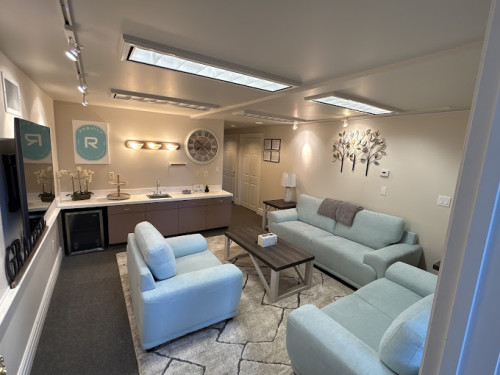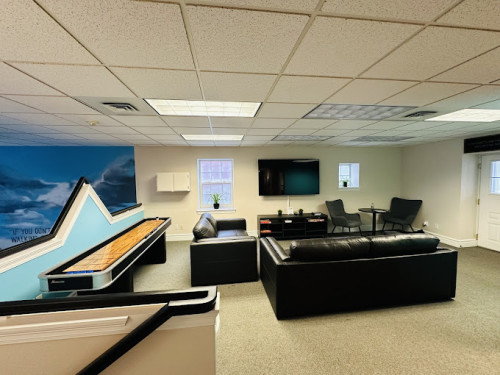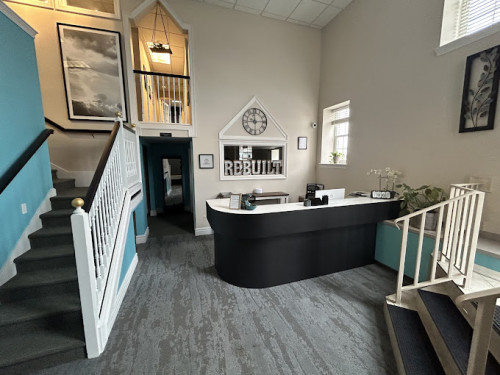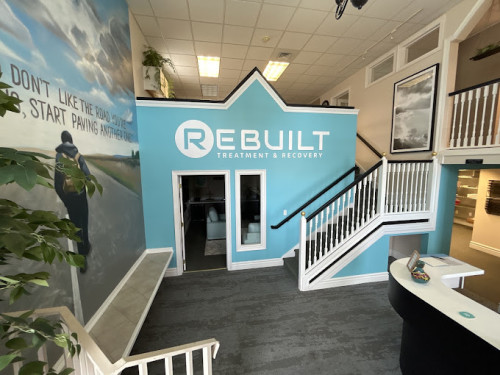






Rebuilt Treatment and Recovery
Treatment Focus
This center primarily treats substance use disorders, helping you stabilize, create relapse-prevention plans, and connect to compassionate support.
Primary Level of Care
Outpatient treatment offers flexible therapeutic and medical care without the need to stay overnight in a hospital or inpatient facility. Some centers offer intensive outpatient program (IOP), which falls between inpatient care and traditional outpatient service.
Claimed
Recovery.com has connected directly with this treatment provider to validate the information in their profile.
Treatment Focus
This center primarily treats substance use disorders, helping you stabilize, create relapse-prevention plans, and connect to compassionate support.
Primary Level of Care
Outpatient treatment offers flexible therapeutic and medical care without the need to stay overnight in a hospital or inpatient facility. Some centers offer intensive outpatient program (IOP), which falls between inpatient care and traditional outpatient service.
Provider's Policy
If you don’t find your insurance listed, don’t hesitate to reach out. There’s a good chance we’ll be able to accommodate you.
Rebuilt Treatment and Recovery
Rebuilt Treatment and Recovery
About Rebuilt Treatment and Recovery
Rebuilt Treatment and Recovery (RTR) provides a haven for holistic wellness and healing through varying levels of outpatient care for addiction, offering an individualized approach blended with medication-assisted treatment and optional sober living. Clients receive structured support through a partial hospitalization program (PHP), an intensive outpatient program (IOP) and traditional outpatient programs (OP), specifically tailored to each individuals unique needs.
A Transformative Journey
Their holistic approach aims to provide sustainable long-term recovery with a diverse range of evidence-based and alternative therapies. Treatment methods may include psycho-education, life skills development, relapse prevention, wellness and nutrition counseling, process groups, vocational and resume building, and housing and aftercare services. Acupuncture is a highlight of their program, providing clients with acupuncture therapy and educational groups, stimulating points in the central nervous system to promote natural healing led by licensed acupuncturists.
Personalized Care
PHP at RTR is best suited for individuals transitioning from detox or a residential program, or for individuals looking for an alternative to residential care. Treatment consists of 6 hours of group therapy, 4 days per week in addition to weekly individual sessions with a personal therapist. IOP provides similar care on a less frequent basis, with 9 hours of group sessions 3 days per week, and biweekly individual therapy. Traditional OP is their lowest level of care, consisting of 1 or 2 weekly group sessions, and monthly or biweekly 1-on-1 sessions.
Clients in need have access to medication-assisted treatment (MAT), providing medications to help calm cravings and reduce withdrawal symptoms for alcohol or opiate addiction.
Optional Sober Living
Clients participating in PHP or IOP at Rebuilt have the option to live in sober housing, ideal for individuals who do not have a stable or safe home environment outside of treatment. RTR provides sober living clients with a supportive peer environment, offering amenities such as a recreation and gaming room, vocational support, and transportation services to and from therapy. As part of their aftercare services, clients are educated on community resources, support groups, ongoing therapy and sober housing outside of the program.
Center Overview
Treatment Focus
This center primarily treats substance use disorders, helping you stabilize, create relapse-prevention plans, and connect to compassionate support.
Insurance Accepted
Cash Pay Rates
Estimated Cash Pay Rate
Center pricing can vary based on program and length of stay. Contact the center for more information. Recovery.com strives for price transparency so you can make an informed decision.
Levels of Care







Your Care Options
Specializations
Drug Addiction
Drug addiction is the excessive and repetitive use of substances, despite harmful consequences to a person's life, health, and relationships.
Medication-Assisted Treatment
Combined with behavioral therapy, prescribed medications can enhance treatment by relieving withdrawal symptoms and focus patients on their recovery.
Who We Treat
Men and Women
Men and women attend treatment for addiction in a co-ed setting, going to therapy groups together to share experiences, struggles, and successes.
Approaches
Evidence-Based
A combination of scientifically rooted therapies and treatments make up evidence-based care, defined by their measured and proven results.
Holistic
A non-medicinal, wellness-focused approach that aims to align the mind, body, and spirit for deep and lasting healing.
Therapies
1-on-1 Counseling
Patient and therapist meet 1-on-1 to work through difficult emotions and behavioral challenges in a personal, private setting.
Life Skills
Teaching life skills like cooking, cleaning, clear communication, and even basic math provides a strong foundation for continued recovery.
Nutrition Counseling
Nutritious food helps patients heal from within, setting them up for mental and bodily wellness as they learn about healthy eating.
Psychoeducation
This method combines treatment with education, teaching patients about different paths toward recovery. This empowers them to make more effective decisions.
Relapse Prevention Counseling
Relapse prevention counselors teach patients to recognize the signs of relapse and reduce their risk.
Substances We Treat
Alcohol
Using alcohol as a coping mechanism, or drinking excessively throughout the week, signals an alcohol use disorder.
Benzodiazepines
Benzodiazepines are prescribed to treat anxiety and sleep issues. They are highly habit forming, and their abuse can cause mood changes and poor judgement.
Cocaine
Cocaine is a stimulant with euphoric effects. Agitation, muscle ticks, psychosis, and heart issues are common symptoms of cocaine abuse.
Drug Addiction
Drug addiction is the excessive and repetitive use of substances, despite harmful consequences to a person's life, health, and relationships.
Heroin
Heroin is a highly addictive and illegal opioid. It can cause insomnia, collapsed veins, heart issues, and additional mental health issues.
Psychedelics
Hallucinogenic drugs—like LSD—cause euphoria and increased sensory experiences. When abused, they can lead to depression and psychosis.
Methamphetamine
Methamphetamine, or meth, increases energy, agitation, and paranoia. Long-term use can result in severe physical and mental health issues.
Opioids
Opioids produce pain-relief and euphoria, which can lead to addiction. This class of drugs includes prescribed medication and the illegal drug heroin.
Prescription Drugs
It's possible to abuse any drug, even prescribed ones. If you crave a medication, or regularly take it more than directed, you may have an addiction.





